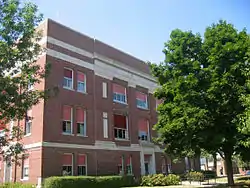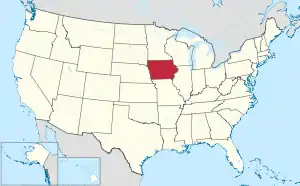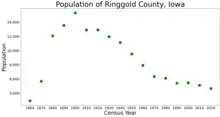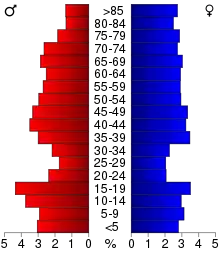Ringgold County | |
|---|---|
 Ringgold County Courthouse in Mount Ayr | |
 Location within the U.S. state of Iowa | |
 Iowa's location within the U.S. | |
| Coordinates: 40°43′56″N 94°14′53″W / 40.732222222222°N 94.248055555556°W | |
| Country | |
| State | |
| Founded | February 24, 1847 |
| Named for | Samuel Ringgold |
| Seat | Mount Ayr |
| Largest city | Mount Ayr |
| Area | |
| • Total | 539 sq mi (1,400 km2) |
| • Land | 535 sq mi (1,390 km2) |
| • Water | 3.4 sq mi (9 km2) 0.6% |
| Population (2020) | |
| • Total | 4,663 |
| • Density | 8.7/sq mi (3.3/km2) |
| Time zone | UTC−6 (Central) |
| • Summer (DST) | UTC−5 (CDT) |
| Congressional district | 3rd |
| Website | www |
Ringgold County is a county located in the U.S. state of Iowa. As of the 2020 census, the population was 4,663,[1] making it the Iowa county with the second-smallest population. The county seat is Mount Ayr.[2] The county is named after Maj. Samuel Ringgold, a hero of the Battle of Palo Alto fought in May 1846, during the Mexican–American War. It is one of the 26 Iowa counties with a name that is unique across the nation.
Geography
According to the U.S. Census Bureau, the county has a total area of 539 square miles (1,400 km2), of which 535 square miles (1,390 km2) is land and 3.4 square miles (8.8 km2) (0.6%) is water.[3]
Major highways
Adjacent counties
- Union County (north)
- Decatur County (east)
- Harrison County, Missouri (southeast)
- Worth County, Missouri (southwest)
- Taylor County (west)
Demographics
| Census | Pop. | Note | %± |
|---|---|---|---|
| 1860 | 2,923 | — | |
| 1870 | 5,691 | 94.7% | |
| 1880 | 12,085 | 112.4% | |
| 1890 | 13,556 | 12.2% | |
| 1900 | 15,325 | 13.0% | |
| 1910 | 12,904 | −15.8% | |
| 1920 | 12,919 | 0.1% | |
| 1930 | 11,966 | −7.4% | |
| 1940 | 11,137 | −6.9% | |
| 1950 | 9,528 | −14.4% | |
| 1960 | 7,910 | −17.0% | |
| 1970 | 6,373 | −19.4% | |
| 1980 | 6,112 | −4.1% | |
| 1990 | 5,420 | −11.3% | |
| 2000 | 5,469 | 0.9% | |
| 2010 | 5,131 | −6.2% | |
| 2020 | 4,663 | −9.1% | |
| U.S. Decennial Census[4] 1790-1960[5] 1900-1990[6] 1990-2000[7] 2010-2018[8] | |||

2020 census
The 2020 census recorded a population of 4,663 in the county, with a population density of 8.6265/sq mi (3.3307/km2). 96.68% of the population reported being of one race. 94.32% were non-Hispanic White, 0.06% were Black, 1.52% were Hispanic, 0.15% were Native American, 0.17% were Asian, 0.02% were Native Hawaiian or Pacific Islander and 3.75% were some other race or more than one race. There were 2,672 housing units, of which 1,945 were occupied.[1]
2010 census
The 2010 census recorded a population of 5,131 in the county, with a population density of 9.5430/sq mi (3.6846/km2). There were 2,613 housing units, of which 2,047 were occupied.[9]
2000 census

As of the census[10] of 2000, there were 5,469 people, 2,245 households, and 1,537 families in the county. The population density was 10 people per square mile (3.9 people/km2). There were 2,789 housing units at an average density of 5 units per square mile (1.9 units/km2). The racial makeup of the county was 99.07% White, 0.11% Black or African American, 0.22% Native American, 0.16% Asian, 0.02% from other races, and 0.42% from two or more races. 0.24% of the population were Hispanic or Latino of any race.
Of the 2,245 households 27.70% had children under the age of 18 living with them, 59.70% were married couples living together, 5.50% had a female householder with no husband present, and 31.50% were non-families. 28.60% of households were one person and 17.80% were one person aged 65 or older. The average household size was 2.37 and the average family size was 2.90.
The age distribution was 24.00% under the age of 18, 6.90% from 18 to 24, 21.40% from 25 to 44, 23.60% from 45 to 64, and 24.00% 65 or older. The median age was 43 years. For every 100 females there were 94.10 males. For every 100 females age 18 and over, there were 89.40 males.
The median household income was $29,110 and the median family income was $34,472. Males had a median income of $24,583 versus $20,606 for females. The per capita income for the county was $15,023. About 9.40% of families and 14.30% of the population were below the poverty line, including 20.40% of those under age 18 and 16.40% of those age 65 or over.
Communities
Cities
Census-designated place
Unincorporated communities
Townships
Population ranking
The population ranking of the following table is based on the 2020 census of Ringgold County.[1]
† county seat
| Rank | City/Town/etc. | Municipal type | Population (2020 Census) |
|---|---|---|---|
| 1 | † Mount Ayr | City | 1,623 |
| 2 | Diagonal | City | 344 |
| 3 | Kellerton | City | 243 |
| 4 | Sun Valley Lake | CDP | 187 |
| 5 | Tingley | City | 136 |
| 6 | Redding | City | 63 |
| 7 | Benton | City | 39 |
| 8 | Delphos | CDP | 26 |
| 9 | Maloy | City | 22 |
| 10 | Ellston | City | 19 |
| 11 | Beaconsfield | City | 15 |
| 12 | Clearfield (mostly in Taylor County) | City | 6 (278 total) |
| 13 | Shannon City (partially in Union County) | City | 6 (73 total) |
Politics
| Year | Republican | Democratic | Third party | |||
|---|---|---|---|---|---|---|
| No. | % | No. | % | No. | % | |
| 2020 | 1,968 | 72.51% | 709 | 26.12% | 37 | 1.36% |
| 2016 | 1,824 | 67.38% | 753 | 27.82% | 130 | 4.80% |
| 2012 | 1,368 | 52.64% | 1,186 | 45.63% | 45 | 1.73% |
| 2008 | 1,401 | 52.10% | 1,236 | 45.97% | 52 | 1.93% |
| 2004 | 1,466 | 52.77% | 1,286 | 46.29% | 26 | 0.94% |
| 2000 | 1,369 | 50.85% | 1,246 | 46.29% | 77 | 2.86% |
| 1996 | 967 | 35.29% | 1,439 | 52.52% | 334 | 12.19% |
| 1992 | 967 | 33.71% | 1,341 | 46.74% | 561 | 19.55% |
| 1988 | 1,110 | 40.64% | 1,609 | 58.92% | 12 | 0.44% |
| 1984 | 1,512 | 48.51% | 1,593 | 51.11% | 12 | 0.38% |
| 1980 | 1,884 | 57.95% | 1,150 | 35.37% | 217 | 6.67% |
| 1976 | 1,543 | 46.25% | 1,739 | 52.13% | 54 | 1.62% |
| 1972 | 2,264 | 68.54% | 1,003 | 30.37% | 36 | 1.09% |
| 1968 | 1,986 | 57.05% | 1,237 | 35.54% | 258 | 7.41% |
| 1964 | 1,571 | 40.91% | 2,260 | 58.85% | 9 | 0.23% |
| 1960 | 2,538 | 58.74% | 1,781 | 41.22% | 2 | 0.05% |
| 1956 | 2,713 | 60.42% | 1,775 | 39.53% | 2 | 0.04% |
| 1952 | 3,442 | 70.66% | 1,408 | 28.91% | 21 | 0.43% |
| 1948 | 2,487 | 55.77% | 1,922 | 43.10% | 50 | 1.12% |
| 1944 | 2,767 | 59.35% | 1,867 | 40.05% | 28 | 0.60% |
| 1940 | 3,507 | 59.50% | 2,374 | 40.28% | 13 | 0.22% |
| 1936 | 3,316 | 55.31% | 2,615 | 43.62% | 64 | 1.07% |
| 1932 | 2,082 | 45.04% | 2,480 | 53.64% | 61 | 1.32% |
| 1928 | 3,674 | 69.57% | 1,572 | 29.77% | 35 | 0.66% |
| 1924 | 3,147 | 60.68% | 882 | 17.01% | 1,157 | 22.31% |
| 1920 | 3,702 | 72.66% | 1,327 | 26.05% | 66 | 1.30% |
| 1916 | 1,733 | 55.46% | 1,351 | 43.23% | 41 | 1.31% |
| 1912 | 916 | 31.28% | 958 | 32.72% | 1,054 | 36.00% |
| 1908 | 1,940 | 61.94% | 1,092 | 34.87% | 100 | 3.19% |
| 1904 | 2,200 | 69.38% | 835 | 26.33% | 136 | 4.29% |
| 1900 | 2,319 | 62.19% | 1,311 | 35.16% | 99 | 2.65% |
| 1896 | 2,209 | 56.47% | 1,651 | 42.20% | 52 | 1.33% |
See also
Notes
References
- 1 2 3 "2020 Census State Redistricting Data". census.gov. United states Census Bureau. Retrieved August 12, 2021.
- ↑ "Find a County". National Association of Counties. Retrieved June 7, 2011.
- ↑ "US Gazetteer files: 2010, 2000, and 1990". United States Census Bureau. February 12, 2011. Retrieved April 23, 2011.
- ↑ "U.S. Decennial Census". United States Census Bureau. Retrieved July 20, 2014.
- ↑ "Historical Census Browser". University of Virginia Library. Retrieved July 20, 2014.
- ↑ "Population of Counties by Decennial Census: 1900 to 1990". United States Census Bureau. Retrieved July 20, 2014.
- ↑ "Census 2000 PHC-T-4. Ranking Tables for Counties: 1990 and 2000" (PDF). United States Census Bureau. Archived (PDF) from the original on March 27, 2010. Retrieved July 20, 2014.
- ↑ "State & County QuickFacts". United States Census Bureau. Archived from the original on July 31, 2011. Retrieved July 20, 2014.
- ↑ "Population & Housing Occupancy Status 2010" (PDF). United States Census Bureau – American FactFinder. Archived (PDF) from the original on October 16, 2020. Retrieved August 15, 2022.
- ↑ "U.S. Census website". United States Census Bureau. Retrieved January 31, 2008.
- ↑ Leip, David. "Dave Leip's Atlas of U.S. Presidential Elections". uselectionatlas.org. Retrieved April 28, 2018.
External links
- Ringgold County Portal style website maintained by the Ringgold County government
- Ringgold County history and information